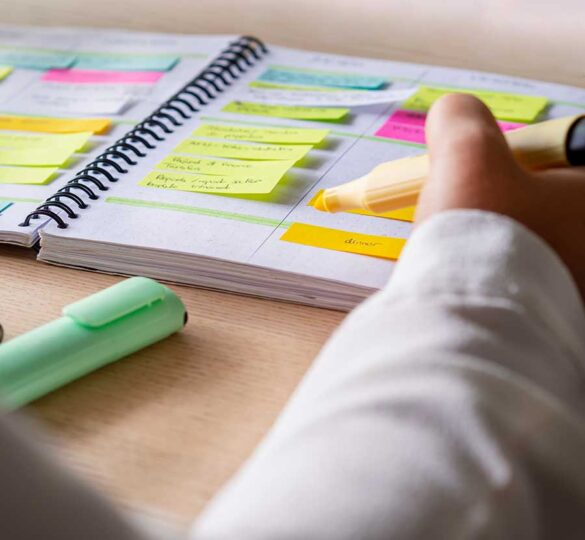Lo que usted puede hacer para controlar su glaucoma
Al informarse, tomar decisiones saludables y mantenerse organizado, podrá establecer una rutina de salud que funcione para usted.

Cumplir con las indicaciones de sus medicamentos para el glaucoma junto con sus otras actividades programadas y responsabilidades puede representar un desafío. Si usted se informa, toma decisiones saludables y se mantiene organizado, podrá definir una rutina de salud que le resulte beneficiosa. Esperamos que los siguientes consejos le sean útiles para controlar su glaucoma.
Conozca sus medicamentos
- Informe a todos los integrantes de su equipo de atención médica, incluido su médico de cabecera y otros especialistas, que usted tiene glaucoma y los medicamentos que está tomando. Esto los ayudará a indicar tratamientos que no interfieran con sus medicamentos para el glaucoma. Tenga especial cuidado al momento de usar medicamentos que contengan cortisona.
- Algunos medicamentos podrían ocasionarle efectos secundarios. Procure informar a su médico sobre los efectos secundarios que presente una vez que haya comenzado a tomar la medicación. La intensidad de los efectos secundarios puede significar que necesita un tipo de medicación diferente.
- Informe a su médico si, por cualquier motivo, los medicamentos no le estén dando resultado, o si su rutina diaria se ha modificado. Es posible que su médico pueda resolver dichos problemas cambiando el tipo de medicamentos o los horarios en que debe tomarlos.
- Informe a su médico todo cambio que presente, especialmente irritación en el ojo, lagrimeo, visión borrosa o aspereza, secresión inusual en vértice del ojo, visión opaca transitoria o arcoíris en torno a las luces por la noche.
Consejos sobre la medicación
- Transforme a sus medicamentos en parte de su rutina diaria. Por ejemplo, puede tomarlos al despertarse, con las comidas y/o al acostarse. Use la alarma del reloj o del teléfono como recordatorio para tomar los medicamentos.
- Si olvida tomar sus medicamentos recetados, tómelos cuando lo recuerde y luego vuelva a cumplir con el cronograma habitual.
- Obtenga un suministro adicional de medicamentos en caso de que extravíe un frasco de gotas oftálmicas o comprimidos. Lleve una receta adicional cuando viaje lejos de su hogar.
Sea organizado
- Mantenga un registro de cada uno de los medicamentos que esté tomando. Escriba el nombre, la dosis y la cantidad de veces que debe tomarlo por día. Consérvelo en su bolso o cartera. Este recordatorio puede ayudarlo a recordar la frecuencia con la que debe usar los medicamentos.
- Programe su próximo chequeo antes de retirarse del consultorio médico, y anote la cita en el calendario.
- Realícese un chequeo antes de emprender un viaje prolongado o comenzar un proyecto exigente a largo plazo.
- Escriba todas las preguntas que tenga sobre sus ojos, la vista o los medicamentos antes de ver al médico. Lleve la lista de preguntas a cada chequeo y tome nota de las respuestas del médico.
Manténgase saludable
- Intente mantener los ojos limpios y libres de sustancias que provoquen irritación. Las mujeres deben tener cuidado con los cosméticos para los ojos, deben usar marcas no alergénicas y reemplazarlos frecuentemente.
- No se frote los ojos, aunque algunos medicamentos para el glaucoma puedan provocar picazón o visión borrosa.
- Use gafas de natación cuando nade, así como gafas de protección cuando haga jardinería o practique deportes de contacto.
- Cuide el resto del cuerpo. Mantener una buena salud general es tan importante como cuidar de los ojos.
- Es importante comer alimentos saludables, hacer suficiente ejercicio, no fumar, no ingerir demasiada cafeína y mantener un peso saludable. Antes de dar inicio a un programa de ejercicio extenuante, consulte a su médico.
- Espacie el consumo de líquidos y disminuya el consumo de sal. Esto ayudará a evitar la retención de líquido.
- Disminuya el estrés cotidiano en su vida. Asegúrese de disponer de tiempo para divertirse y relajarse.